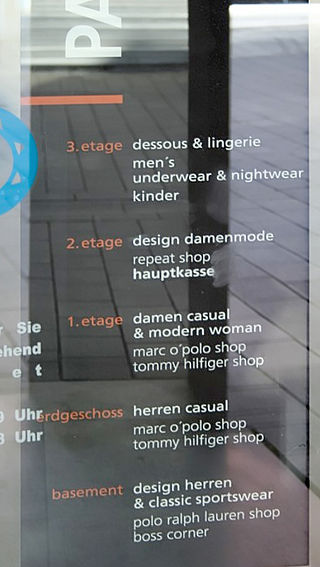Related Research Articles
In linguistics, a false friend is a word in a different language that looks or sounds similar to a word in a given language, but differs significantly in meaning. Examples of false friends include English embarrassed and Spanish embarazado 'pregnant'; English parents versus Portuguese parentes and Italian parenti ; English demand and French demander 'ask'; and English gift, German Gift 'poison', and Norwegian gift 'married'.

A loanword is a word at least partly assimilated from one language into another language, through the process of borrowing. Borrowing is a metaphorical term that is well established in the linguistic field despite its acknowledged descriptive flaws: nothing is taken away from the donor language and there is no expectation of returning anything.
In linguistics, a calque or loan translation is a word or phrase borrowed from another language by literal word-for-word or root-for-root translation. When used as a verb, “to calque” means to borrow a word or phrase from another language while translating its components, so as to create a new lexeme in the target language. For instance, the English word "skyscraper" has been calqued in dozens of other languages, combining words for "sky" and "scrape" in each language, as for example, German: Wolkenkratzer, Portuguese: Arranha-céu, Turkish: Gökdelen. Another notable example is the Latin weekday names, which came to be associated by ancient Germanic speakers with their own gods following a practice known as interpretatio germanica: the Latin "Day of Mercury", Mercurii dies, was borrowed into Late Proto-Germanic as the "Day of Wōđanaz" (Wodanesdag), which became Wōdnesdæg in Old English, then "Wednesday" in Modern English.
Standard High German (SHG), less precisely Standard German or High German, is the umbrella term for the standardized varieties of the German language, which are used in formal contexts and for communication between different dialect areas. German is a pluricentric Dachsprache with currently three codified specific national varieties: German Standard German, Austrian Standard German and Swiss Standard German.
Schnapps or schnaps is a type of alcoholic beverage that may take several forms, including distilled fruit brandies, herbal liqueurs, infusions, and "flavored liqueurs" made by adding fruit syrups, spices, or artificial flavorings to neutral grain spirits.
The German orthography reform of 1996 was a change to German spelling and punctuation that was intended to simplify German orthography and thus to make it easier to learn, without substantially changing the rules familiar to users of the language.

Denglisch is a term describing the increased use of anglicisms and pseudo-anglicisms in the German language. It is a portmanteau of the German words Deutsch (German) and Englisch. The term is first recorded from 1965.

Fräulein is the German language honorific for unmarried women, comparable to Miss in English and Mademoiselle in French.
An anglicism is a word or construction borrowed from English by another language.

The Duden is a dictionary of the Standard High German language, first published by Konrad Duden in 1880, and later by Bibliographisches Institut GmbH. The Duden is updated regularly with new editions appearing every four or five years. As of December 2020, it is in its 28th edition. It is printed as twelve volumes, with each volume covering different aspects of the German language such as loanwords, etymology, pronunciation, synonyms, etc.

Scouse is a type of stew - typically made from chunks of meat with potatoes, carrots and onion. It is particularly associated with the port of Liverpool, hence the inhabitants of that city are often referred to as "scousers". The word "scouse" comes from lobscouse, a stew commonly eaten by sailors throughout northern Europe in the past, and surviving in different forms there today.

The duit was an old low-value Dutch copper coin. Struck in the 17th and 18th centuries in the territory of the Dutch Republic, it became an international currency. It had the value of 1/8 stuiver.

Pimpf is a German nickname for a boy before his voice changes. It is a colloquial word from Upper German meaning "boy", "little rascal", "scamp", or "rapscallion". It has the same etymology as pimp and pimple.
A semantic loan is a process of borrowing semantic meaning from another language, very similar to the formation of calques. In this case, however, the complete word in the borrowing language already exists; the change is that its meaning is extended to include another meaning its existing translation has in the lending language. Calques, loanwords and semantic loans are often grouped roughly under the phrase "borrowing". Semantic loans often occur when two languages are in close contact, and they take various forms. The source and target word may be cognates, which may or may not share any contemporary meaning in common; they may be an existing loan translation or parallel construction ; or they may be unrelated words that share an existing meaning.

Palatschinke is a thin crêpe-like variety of pancake of Greco-Roman origin. The dessert is common in the Balkans, Central and Eastern Europe.
Euro English, Euro-English or European English, less commonly known as EU English, Continental English and EU Speak, is a group of dialects of the English language as used in continental Europe, based on common mistranslations and the technical jargon of the European Union (EU) and the native languages of its non-native, English-speaking population. It is mostly used among EU staff, expatriates and migrants from EU countries, young international travellers and European diplomats with a lower proficiency in the language.

In German, a medial capital I is a non-standard, mixed case typographic convention used to indicate gender inclusivity for nouns having to do with people, by using a capital letter 'I' inside the word surrounded by lower-case letters. An example is the word LehrerInnen. With a lower case I in that position, Lehrerinnen is just the standard word for "female teachers".
Bahnhof verstehen derives from the German language idiomatic phrase "Ich verstehe nur Bahnhof" – I only/just understand "train station" – meaning to not be able, or perhaps not willing, to understand what is being said. It has the equivalent meaning to the English language idiom "It's all Greek to me".
References
- ↑ Ayres-Bennett 2014, p. 325,335.
- ↑ Ilse Sørensen, English im deutschen Wortschatz, 1997, p. 18, as quoted in Onysko, 2007, p. 53: "words that look English, but which deviate from genuine English words either formally or semantically"
- ↑ Sicherl 1999, p. 14.
- ↑ Duckworth 1977.
- ↑ Onysko 2007, p. 52The term pseudo-anglicism" describes the phenomenon that occurs when the RL['receptor language'; p.14] uses lexical elements of the SL['source language'; p.14] to create a neologism in the RL that is unknown in the SL. For the German language, Duckworth simply defines pseudo anglicisms as German neologisms derived from English language material.
- ↑ Nicol Spence 1976, as quoted in Ayres-Bennett, 2014, p. 335
- ↑ Henrik Gottlieb, "Danish pseudo-Anglicisms: A corpus-based analysis", p. 65 in Furiassi 2015
- ↑ Filipović 1990.
- ↑ Saugera 2017, p. 54, 3.4.2 False anglicisms.
- ↑ Picone 1996, p. 316.
- 1 2 3 4 Onysko 2007, p. 52.
- ↑ Carstensen 2015, p. 77
The influence of a 'donor language' upon a 'recipient language' can be seen also, and above all, in the so-called pseudo-loanwords, as the literature names them. Den intensiven Einfluß einer donor language auf eine recipient language zeigen auch und ganz besonders die in der Literatur so genannten Scheinentlehnungen an. - ↑ Duckworth 1977, [page needed] : Neubildungen der deutschen Sprache mit Englischem Sprachmaterial.; as quoted in: Carstensen (2015, p. 77)
- ↑ Furiassi 2010, p. 34, quoted in Lujan-Garcia (2017, p. 281)
"[A] word or idiom that is recognizably English in its form (spelling, pronunciation, morphology, or at least one of the three), but is accepted as an item in the vocabulary of the receptor language even though it does not exist or is used with a conspicuously different meaning in English." - ↑ Anderman 2005, p. 164.
- ↑ Filipović 1990, p. 138–139, 4.7 Adaptation of pseudoanglicisms.
- ↑ Rey-Debove 1990, p. 1018.
- ↑ Furiassi 2015, p. 17.
- ↑ Broder Carstensen, "Euro-English", in Linguistics across historical and geographical boundaries: in honour of Jacek Fisiak..., 2, in Trends in Linguistics: Studies and Monographs32, 1986, p. 831
- ↑ e.g., Λεξικό της κοινής Νεοελληνικής s.v. σμόκιν
- 1 2 3 4 5 Collins le Robert French Dictionary, 11th ed., 2020, s.v.
- ↑ «Autostop», Vocabolario Treccani on line, Istituto dell'Enciclopedia italiana
- 1 2 3 4 Georgios Babiniotis, Λεξικό της Νέας Ελληνικής Γλώσσας, 1998, s.v.
- 1 2 3 Gorlach, 2001, s.v.
- ↑ "SBL Herr". www.sblherr.se.
- ↑ PONS Online Dictionary
- ↑ PONS Online Dictionary
- ↑ 'PONS Online Dictionary
- ↑ "Camping".
- ↑ smoking, Den Danske Ordbog
- ↑ "Smoking".
- ↑ "Duden | Smoking | Rechtschreibung, Bedeutung, Definition, Herkunft". www.duden.de (in German). Retrieved 13 August 2021.
- ↑ Oxford Paravia Italian Dictionary, 2001, ISBN 0198604378, s.v.
- 1 2 Furiassi 2015, p. 42.
- ↑ "Search result for '원샷'" . Retrieved 9 August 2023.
- ↑ "Search result for '핸드폰'" . Retrieved 9 August 2023.
- ↑ "8 words that look like English but actually aren't – ESL language studies abroad". ESL Stories. 1 October 2019. Retrieved 29 July 2021.
- 1 2 3 4 5 6 7 Clyde Thogmartin, "Some 'English' Words in French", The French Review57:4:447-455 (March 1984) JSTOR 393310
- 1 2 3 4 Ayres-Bennett 2014, p. 335.
- 1 2 3 4 5 6 Matthew Anderson, "The foreign words that seem like English – but aren't", BBC Culture 13 October 2016
- ↑ Collins le Robert French Dictionary, 11th ed., 2020, s.v. (usage note)
- ↑ Geyer 1903, p. 19.
- 1 2 "English Translation of "autobus" | Collins Italian-English Dictionary".
- ↑ «Autogrill», Vocabolario Treccani on line, Istituto dell'Enciclopedia italiana
- ↑ «Beauty farm», Vocabolario Treccani on line, Istituto dell'Enciclopedia italiana
- ↑ «Bloc-Notes», Vocabolario Treccani on line, Istituto dell'Enciclopedia italiana
- ↑ Cristiano Furiassi, "How jolly is the joker? Problemi di traducibilità dei falsi anglicismi" in the Atti del 5° congresso di studi dell’Associazione Italiana di Linguistica Applicata (AItLA). Bari, 17,18 febbraio 2005
- ↑ babylift, Den Danske Ordbog
- ↑ butterfly, Den Danske Ordbog
- ↑ cottoncoat, Den Danske Ordbog
- ↑ cowboytoast, Den Danske Ordbog
- ↑ doorstep, Wiktionary
- ↑ "Legekøkken | Køb dit legetøjskøkken online her | Coop.dk". shopping.coop.dk.
- ↑ monkeyclass, Den Danske Ordbog
- ↑ speedmarker, Den Danske Ordbog
- ↑ stationcar, Den Danske Ordbog
- ↑ timemanager, Den Danske Ordbog
- ↑ Vullers, Pim (2012). "Beamer (LaTeX)". Radboud University. Retrieved 9 December 2020.
- 1 2 "Duden | Homeoffice | Rechtschreibung, Bedeutung, Definition, Herkunft". www.duden.de (in German). Retrieved 13 August 2021.
- ↑ "Duden | Beamer | Rechtschreibung, Bedeutung, Definition, Herkunft". www.duden.de (in German). Retrieved 14 March 2021.
- 1 2 "German Pseudo-Anglicisms – Yabla German – Free German Lessons".
- ↑ "Duden | Funsport | Rechtschreibung, Bedeutung, Definition, Herkunft". www.duden.de (in German). Retrieved 13 August 2021.
- ↑ "Handy ohne Vertrag: Angebote März 2023". www.sparhandy.de.
- ↑ "Duden | Jobticket | Rechtschreibung, Bedeutung, Definition, Herkunft". www.duden.de (in German). Retrieved 13 March 2021.
- ↑ "Duden | Trampen | Rechtschreibung, Bedeutung, Definition, Herkunft". www.duden.de (in German). Retrieved 13 May 2021.
- ↑ "Sixpence". www.skittfiske.no. Retrieved 18 September 2022.
- ↑ "After work ett svenskt påhitt". Dagens Nyheter (in Swedish). 11 March 2015. Retrieved 12 December 2015.
- ↑ "Topplistan Pocket – Akademibokhandeln". www.akademibokhandeln.se.
- ↑ "dres". Słownik wyrazów obcych (in Polish). Wydawnictwo Naukowe PWN. Retrieved 11 April 2012.[ permanent dead link ]
- ↑ "Преимущества и недостатки дресс-кроссинга". 19 September 2015.
- ↑ Baldwin 2020, Клипмейкер.
- ↑ «страйкбол», «Словари и энциклопедии на Академике»
- ↑ Страйкбол, «Википедия»
- ↑ Escalona, Katrina (5 September 2017). "16 English Words and Sayings Travellers Won't Understand in the Philippines". theculturetrip.com. Retrieved 7 January 2019.
- 1 2 3 4 5 6 Johari, Farouq. "21 'English Words' Yang Menyimpang Jauh Maksudnya Bila Orang Kita Guna Untuk Bersembang". says.com.
- 1 2 3 4 "9 perkataan English yang terpesong maknanya bila di-Melayukan". soscili.my. 13 August 2016. Retrieved 5 September 2022.
- 1 2 3 Roslan, Rizmi (18 January 2015). "10 Perkataan English Yang Telah Di Melayukan. Mat Salleh Pun Takkan Faham". The Vocket.
- 1 2 Kompasiana.com (5 September 2012). "Istilah Bahasa Inggris Kreasi Orang Indonesia". KOMPASIANA (in Indonesian). Retrieved 11 December 2023.
- ↑ Chucky (26 November 2016). "5 Kelmiet Li Taħsibhom Ingliżi Imma Mhumiex". Lovin Malta. Retrieved 24 February 2024.